

Collaborative for Academic, Social, and Emotional Learning. Core_Competencies_3_White_Back.png (960×1036) Video Games and Social Emotional Learning. A lot of talk, press, and focus in this era of learning is on common core standards and 21st century skills and literacies.
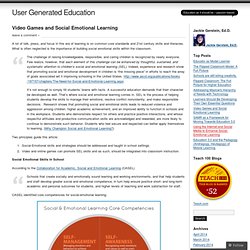
What is often neglected is the importance of building social emotional skills within the classroom. The challenge of raising knowledgeable, responsible, and caring children is recognized by nearly everyone. Few realize, however, that each element of this challenge can be enhanced by thoughtful, sustained, and systematic attention to children’s social and emotional learning (SEL).
Indeed, experience and research show that promoting social and emotional development in children is “the missing piece” in efforts to reach the array of goals associated wit h improving schooling in the United States. Not enough to simply fill students’ brains with facts. Two principles guide this article: Developing Character, Courage & College Readiness. Leaders often cut their own path.
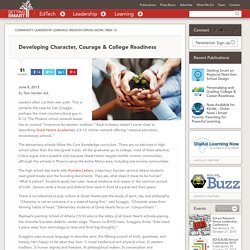
That is certainly the case for Dan Scoggin, perhaps the most countercultural guy in K-12. The Phoenix school network leader has an unusual “reverence for western tradition.” Back-to-basics doesn’t come close to describing Great Hearts Academies, a K-12 charter network offering “classical education, revolutionary schools.” The elementary schools follow the Core Knowledge curriculum. There are no electives in high school (other than the latin/greek track). The high school day starts with Humane Letters, a two-hour Socratic seminar where students read great books and the founding documents.
There is no reference to pop culture at Great Hearts–just the study of spirit, law, and philosophy. Raphael’s painting School of Athens (1510) adorns the lobby of all Great Hearts schools–placing the Aristotle-Socrates dialectic center stage. Scoggins uses unusual language to describe aims: the lifelong pursuit of truth, goodness, and beauty. Kern Convening. Downloadable Articles. 21st Century Education from the Inside Out, Mark Wilding Adopting the Disposition of the “Self-Scientist” , Laura Weaver “Fostering Connection, Compassion, and Character at School” in Independent School Journal , Winter 2002, Rachael Kessler “Grief as a Gateway to Love in Teaching” in Dan Liston and Jim Garrison(eds), Teaching, Loving, and Learning.
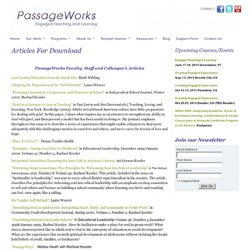
New York: Routledge (2003). Adults in traditional American culture have little preparation for dealing with grief. “Have You Ever?” Lessons from the Field: Teaching Foundational Life Skills Through Baseball. Summer heat, eating hot dogs, and cheering for home runs -- it's baseball season once again.
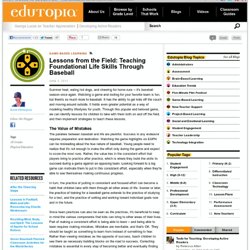
Watching a game and rooting for your favorite team is fun, but there's so much more to baseball. It has the ability to get kids off the couch and moving around outside. It holds even greater potential as a way of modeling healthy lifestyles for youth. Through this popular and beloved game, we can identify lessons for children to take with them both on and off the field, and then implement strategies to teach these lessons. The Value of Mistakes The parallels between baseball and life are plentiful. In turn, the practice of putting in consistent and focused effort can become a habit that children take with them through all other areas of life. Since team practices can also be seen as life practices, it's beneficial to keep in mind the various components that kids can bring to other areas of their lives. The Real Meaning of Winning The learning opportunities don't end with team practices.
6 Innovations in Social Emotional Learning. Social emotional learning “teaches the skills we all need to handle ourselves, our relationships, and our work, effectively and ethically,” says Collaborative for Academic, Social, and Emotional Learning (CASEL).
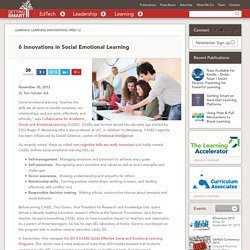
CASEL was formed almost two decades ago started by CEO Roger P. Weissberg who is also professor at UIC. In addition to Weissberg, CASEL’s agenda has been influenced by Daniel Goleman, author of Emotional Intelligence. As recently noted, these so-called non-cognitive skills are really important–just badly named. CASEL defines social emotional learning (SEL) as: Before joining CASEL, Paul Goren, Vice President for Research and Knowledge Use, spent almost a decade leading education research efforts at the Spencer Foundation.
In September they released the 2013 CASEL Guide Effective Social and Emotional Learning Programs. Social Emotional Learning. What Is SEL? Social and Emotional Learning. Restoring the Soul and Skill of Educators Through Engaged Teaching. Image credit: iStockphoto In the aftermath of the testing regimen, or just the headlong rush to the end of school, educators are loosening their collars, breathing heavy sighs of relief (or resignation), and contemplating whether there is a little time in the remaining weeks to return to their first love: being an educator of young people.

For too much of the school year, education takes a back seat to instruction. Rachael Kessler, of blessed memory, described this process two decades ago as the loss of the soul of education and in a book of that name, spoke eloquently about how to restore it. The needs she identified then are even stronger now, because not only is the soul of education threatened, so are the souls of educators. I asked Laura and Mark, who consider Rachael Kessler as their primary mentor and inspiration, to share their thoughts about Engaged Teaching: Maurice Elias: What are the five dimensions of engaged teaching?